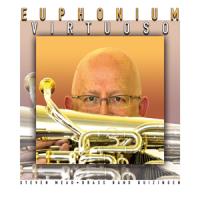Euphonium Virtuoso review by Iwan Fox - 18 June 2006
You have got to hand it to Steven Mead. The term virtuoso is an apt and accurate description of the man and his talents.
Be it playing on the catwalks of Milan to judging at the Spring Festival at Blackpool, this remarkable musician continues to explore new musical territory like a latter day Marco Polo. It therefore comes as no surprise that his latest solo recording is such an enjoyable, and interesting release.
Perhaps more than any performer brought up in the UK brass band medium, Steven Mead has the greatest understanding of the potential, as well as excellence of the European brass and wind band scene. His ongoing work with many leading European based brass and wind ensembles, including the recent production of the well received '20 Supreme Years' with the Eikanger Bjorsvik Band, and with leading chamber ensembles such as ‘Sound-Inn-Brass' show that his sense of musical exploration continues to fuel his artistic drive.
The seven pieces here reveal a performer using his immense technical and musical gifts to secure that new territory for the euphonium for future generations, although he does take the opportunity to provide the listener with an immensely satisfying account of a existing classic of the repertoire too.
Throughout he is accompanied with immense skill and understanding by Brass Band Buizingen from Belgium under their Musical Director Luc Vertommen, and it is a rare treat to hear such subtle and detailed accompaniment to a solo instrument in the brass band medium. The band provides a solid and unpretentious foundation, but one that given the correct opportunity enhances the mood as well as the timbre of the pieces performed. It is very high class playing indeed.
The same must also be said of the arrangements themselves – four of which have been undertaken by Luc Vertommen with a real sense of lightness of style, and at times a neat, sly wit.
Philip Sparke's ‘Harlequin' is as colourful as the jester's jacket, and although it derives much of its structure from the same bedrock of his other showpiece compositions for the instrument such as ‘Pantomime' and ‘Part Piece' it is nevertheless an enjoyable virtuosic tour de force that is played with a real sense of style by the soloist.
The ‘Concerto per Flicorno Basso' meanwhile is an archeological gem – unearthed from the dusty vaults of the long since deceased Italian composer Amilcare Ponchielli. Ostensibly a theme and variations showcase, it departs from the norm by virtue of a lovely, almost overture like introduction for band, before the soloist explores not just technical boundaries, but also those of instrument timbre. Making euphonium to sound like a mandolin is asking a lot, but it does work when in the hands of a musician of this quality. The finale really is something to behold.
For the brass band purist the next two items really do make the mouth water. First up is Gilbert Vinter's, ‘The Playful Pachyderm', initially written for bassoon with piano accompaniment as far back as 1942.
With its dark wit (its more a Roald Dahl treatment rather than sugar coated Walt Disney) it's a delightful piece of musical imagination, enhanced greatly by the performers sense of mischief and the clever and almost ironic twist in its tail from the arranger with its nod to Vinter's most colourful test piece.
There is a real sense of elegance about the writing of Joseph Horovitz, and in celebration of the composer's 80th birthday, Steven has chosen to return to his ‘Euphonium Concerto' (written in 1972) to reveal once more a work of immense stature.
Beautifully structured and thematically developed the Concerto is a reflection of the composer's desire to give license to the performer to impose his own individual mark upon the music. The inherent technicalities never subjugate the musical inspiration and so the soloist can mould and structure their performance in accordance with their own thoughts. Here Steven delivers that sense of elegance and lyricism in a performance that breathes fresh life into a well loved classic.
The New Zealand folk song ‘Pokarekare Ana' makes for a lovely aperitif for the other major work on the release – Friedrich Gulda's ‘Concerto for Cello and Wind Orchestra' which is a musical version it seems of a Salvadore Dali painting – absolute brilliant nonsense.
Here was a man who must have had a head full of musical marbles, for he picks out just about every genre in the business and moulds them together in some sort of kaleidoscopic miasma that you know shouldn't work on paper, but simply thrills the pants of you when you get to listen to it.
That it works so splendidly here is down to the soloist who is on sparkling form, and the arranger (Luc Vertommen) who really does manage to retain the sense of mischief, fun and downright bonkersness of this immensely ambitious but equally enjoyable work. Everything and more is here from what seems like mid 70's Swedish porn music, to Austrian alphorns, Viennese waltzes to a circus march with added touches of cool jazz and even Mozart thrown in for good measure. It is mind bogglingly, absurdly brilliant.
The recording ends with a lovely performance of ‘Introduction and Tarantella' by Pablo de Sarasate which is as tasteful and cultured a performance as you would ever likely to hear.
It all rounds off a superb release, well engineered and produced (even if the front cover picture does make Steven's pate look like a colour photo of the lunar landscape) and showing that the horizons for the euphonium are still being pushed further and further by this outstanding musician.
Iwan Fox - www.4barsrest.com

Brass Band Buizingen (Belgium)
conductor/arranger Luc Vertommen

